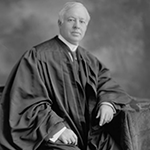
Joseph Rucker Lamar (1911-1916)
Joseph Lamar lived from 1857 to 1916.
Early Life
Lamar was born in Ruckersville, Georgia. As a child, he attended the Academy of Richmond County in Augusta and the Martin Institute in Jefferson. In Augusta, Lamar lived next door to Woodrow Wilson and the two became very good friends. Lamar graduated from the Penn Lucy School near Baltimore, Maryland. He then attended the University of Georgia, where he was a member of the Phi Kappa Literary Society before graduating from Bethany College in 1877. Following graduation, Lamar enrolled in law school at Washington and Lee University School of Law. After reading law with a well-known attorney in Augusta, Lamar returned to Bethany College and taught Latin for a year. He passed the Georgia bar in 1880, and then began practicing law in Augusta.
Legal Career
Lamar served in the Georgia House of Representatives from 1886 to 1889. In 1893, the Supreme Court of Georgia appointed him as a member of the Commission to Recodify the Laws of Georgia. He took part in preparing a code of laws for the state of Georgia, which the state General Assembly adopted two years later. In 1901, Lamar was appointed to fill seat on the Supreme Court of Georgia. While on the bench, Lamar wrote more than 200 opinions. In 1905, he resigned and returned to private practice.
Appointment to the Supreme Court
In 1910, President William Howard Taft nominated Lamar to the United States Supreme Court. As Lamar had had limited contact with President Taft, this nomination came as a surprise. Lamar was also not well-known outside of the South–yet he was able to receive confirmation by a Republican Senate just five days after his nomination. In 1914, Lamar was selected as a U.S. representative at the ABC Powers Conference, a conference created to avoid a war after the Veracruz incident of 1914. Following President Woodrow Wilson’s inauguration reception, the two friends reconnected and shared childhood memories. They both remained in contact while in Washington.
Lamar’s tenure on the bench was relatively mundane. However, in 1915, Lamar wrote two short opinions in the infamous Leo Frank case. Frank brought a petition for habeas corpus, challenging the fairness of his trial. While Lamar declined to grant the petition, he later granted a writ of error, allowing Frank to bring his claims before the Court. Eventually, the full Court rejected Frank’s claim in Frank v. Mangum. Lamar voted with the majority but did not pen a separate opinion.
Death
Lamar died on January 2, 1916 from declining health in Washington, D.C.







